Text published in 2020 on the occasion of the 50th anniversary of IALHI by Lucas Poy, IALHI Executive Assistant. Click here for a PDF version.
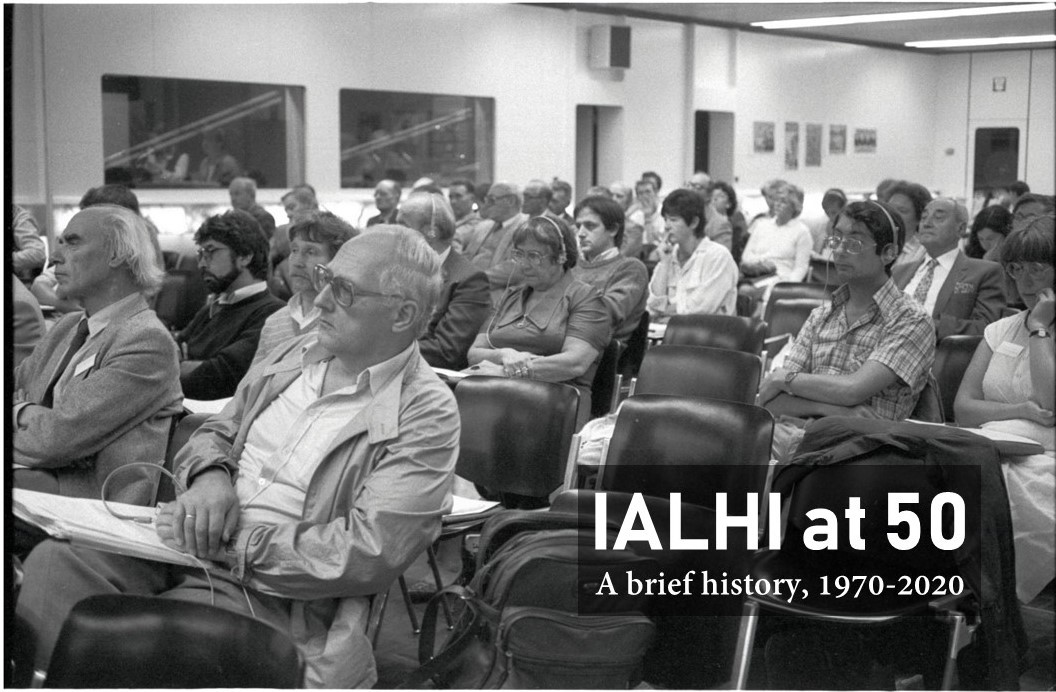
Ghent, 1985 © Amsab-ISH
50 years ago
On Monday 7 December 1970 a meeting took place at the Transport House on Smith Square in central London, a building of great historic significance, which had been the headquarters of the Transport and General Workers’ Union, the Labour Party, the Trades Union Congress, and the Workers’ Travel Association. A dozen people were present, representing institutions from Great Britain, the Netherlands, West Germany, Switzerland, and Sweden: the Labour Party, the Trades Union Congress, the London School of Economics, and the International Co-operative Alliance (all based in London), the Co-operative Union (Manchester), the International Institute of Social History (Amsterdam), the Working Committee of Co-operative Librarians and documentation (Rotterdam), the Abteilung Werbung-Archiv, Deutscher Gewerkschaftsbund (Düsseldorf), the Friedrich-Ebert-Stiftung (Bonn), the Schweizerisches Sozialarchiv (Zürich), and the Arbetarrörelsens arkiv (Stockholm).
The meeting had been arranged by Irene Wagner, chief librarian of the Labour Party. Born in Dresden during the First World War, she became an activist at an early age, smuggling anti-Nazi literature during travels to Czechoslovakia. Irene and her parents escaped Germany in 1937, and settled in London. [1]
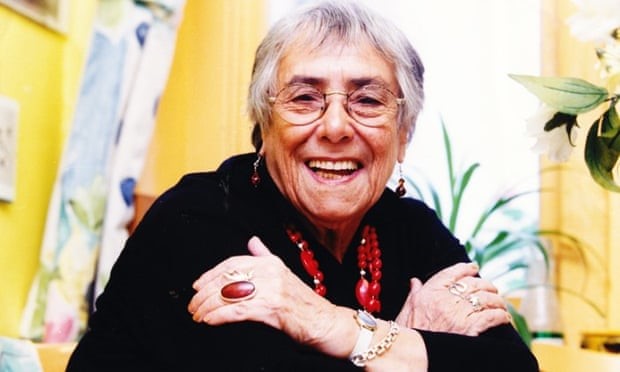
Irene Wagner © The Guardian
Wagner understood the necessity of ‘forming an association of likeminded librarians’, as she wrote in a letter to a number of colleagues in May 1970. In a report published some years later, she explained that ‘neither librarians or archivists who work in the labour movement have so far had a chance to get together as a body of specialists’ and that ‘there was no provision for such a meeting at the professional international conferences, where political subjects are never discussed, and one found oneself at a disadvantage to know who was who’.[2]
In order to overcome these difficulties, she called a number of colleagues to ‘meet in “swinging” London sometime in the autumn and have a general exchange of views and start the ball rolling’.[3] And, indeed, the initiative found fertile ground. After two days of discussions, the delegates agreed to set up the International Association of Labour History Institutions.
Membership: Who is part of the IALHI?
The eleven institutions that participated in the founding conference all came from Western European countries. As a recent account puts it, ‘it was a combination of institutions of the movement (at that time mainly social democratic) and specialized institutions that collected and did research about the movement’.[4] The first ‘constitution’ of the newly created association, indeed, stated that ‘membership shall consist of representatives of libraries and archives established in organizations of the labour movement’. Even though it was mentioned that new members could come ‘from both West and East’, the minutes expressed a note of caution and pointed out that ‘as far as non-European institutions are concerned, it was felt that these could be accepted at a slightly later date’. The second conference, held in Stockholm in the summer of 1971, stressed that ‘those of us belonging to social-democratic organizations with libraries and archives had a special role to play’.[5]
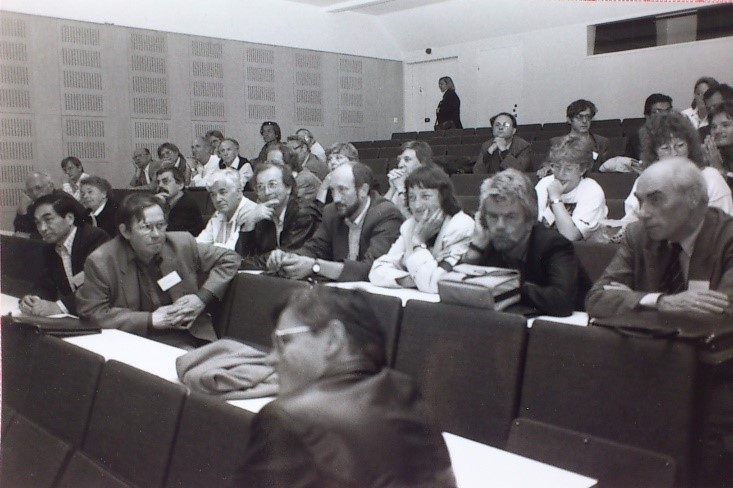
Helsinki, 1990 © Chris Coates
Certainly, the IALHI had come to life in the context of a Western Europe where the Cold War was still a stark reality. The political affiliation of potential institutions, and therefore of the IALHI as such, became a serious matter of discussion: the minutes of the second conference admitted that ‘certain anxieties were voiced as to suitability of certain sections of the labour movement which could be included’. It was decided that ‘the secretary would approach the Socialist International with a view to their suggestions for membership’.[6] In particular, the main issue was the relationship with institutions associated with the Soviet bloc and Western European communist parties, a delicate point for labour libraries and archives, as they sometimes found themselves ‘competing’ with each other for archival materials.[7]
The tensions reached a climax in the mid-1970s, when the IALHI was confronted with a Mexican-Russian initiative to create a new global organization of labour history institutions and research. The minutes of the 8th Congress (Vienna, 1977) noted the ‘manoeuvres of a number of East European organizations this spring, which caused considerable commotion among our membership’. Meetings were held, with Milan as a sort of neutral ground, to discuss the possibilities and limits of cooperation between the IALHI and the new organization. Altogether, the IALHI membership strove to preserve its ‘integrity’, and prevent being absorbed by a new association.[8] Ultimately, tensions receded — as Jaap Kloosterman put it, ‘it was one of the few points of contention in the exemplary peaceful history of the IALHI’ but eventually turned out to be nothing more than ‘a storm in a teacup’.[9]
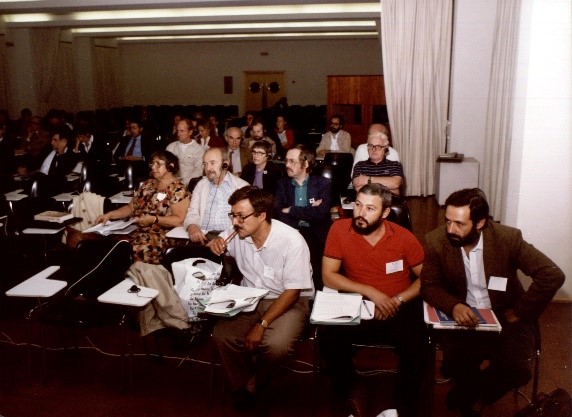
Madrid, 1984 © Fundación Pablo Iglesias
In the 1970s and 1980s the IALHI grew steadily: there were 15 members in 1972, 38 in 1974, 48 in 1977, and 69, from 20 countries, at the tenth anniversary in 1980. The number rose to 93 in 1988. As Cold War tensions faded, the Western European and social democratic character of the IALHI also slowly diluted. During the 1990s, a greater deal of attention was paid to recruiting members from other continents. Comparing the situations of 1996 and 1988, former secretary Jaap Kloosterman noted that the number of members had grown only from 91 to 99, but celebrated that ‘the geographical distribution has considerably widened: in 1988, 21 countries were represented as against 27 today. Portugal was lost, but Argentina, Australia, the Czech Republic, Greece, Hungary, Iceland and the Russian Federation joined the group’. He also noted that the number of museums had grown, while the presence of party-based institutions had weakened.[10]
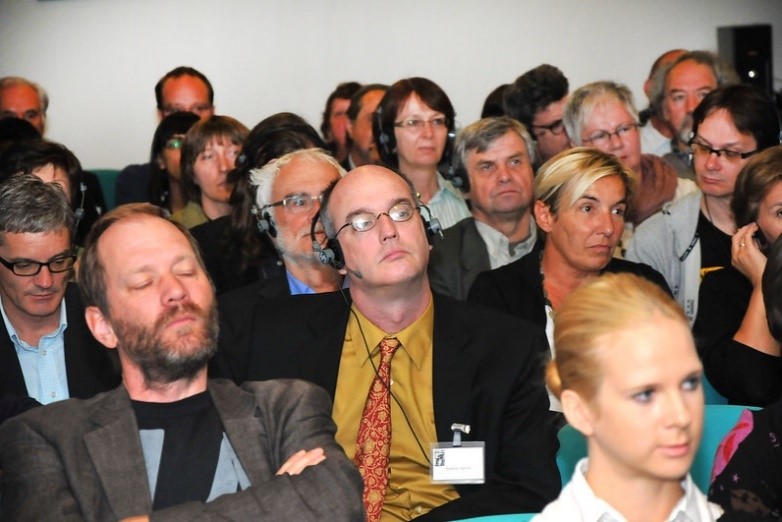
Amsterdam, 2010
In 1997, for the first time, the conference was held outside Europe, at the George Meany Center for Labor Studies, near Washington D.C. In his opening speech, IALHI secretary Wouter Steenhaut said he hoped the organization of the event in another continent would help ‘create a new basis for a more international operation of the IALHI, which would involve in particular the non-European members more closely in the IALHI's activities’. It was, he concluded, ‘a unique opportunity for the IALHI to move away from its Eurocentric base’.[11] This concern to extend the reach of the IALHI to different parts of the world, and to the Global South in particular, has grown in the last two decades. A survey among members done in 2006 showed that ‘most answers say that it is necessary to extend the influence of the IALHI to other continents’. In 2008, the conference was held in South Africa. Even though it became clear that a smaller number of delegates from European countries participated in the conferences when they were held overseas, the minutes of a special workshop held in 2009 celebrated that ‘new members from non-western countries (Africa and South America) recently joined us; money is lacking, but their activism is stronger’.[12]
Currently, in 2020, the IALHI has 121 members coming from all five continents. With 94 institutions (77%), Europe still represents an overwhelming majority, but the proportion of members from other regions is growing: there are 10 institutions from Latin America (Argentina, Brazil, Bolivia, Cuba, and Mexico), 8 from the United States and Canada, 5 from Asia (Japan, Nepal, Vietnam, and Indonesia), 3 from Australia, and 1 from South Africa. In 2022, the 52th conference will be held in Buenos Aires.[13]
Structure: How does the IALHI work?
The IALHI was established with a very simple structure. The core of its activities was, and still is, the organization of an annual event, which includes a general assembly —where members are informed about current issues and make decisions about the future plans— and a conference that promotes discussion of common problems and exchange of practical information and insights.[14] As IALHI was an initiative to bring together existing institutions to create a network for the exchange of knowledge, it did not need a very bureaucratic organization. The first conference elected Irene Wagner as a secretary, with administrative work supported by the institutes at Amsterdam and Stockholm.
Wagner was re-elected unanimously in the 1975 conference and remained in that position until 1980, when Karl Lang, from the Swiss Schweizerisches Sozialarchiv, took over the role. In 1987 Lang was replaced by Jaap Kloosterman (International Institute of Social History), who acted as secretary until 1996. Afterwards, the position was occupied for somewhat shorter periods: those who chaired the IALHI in the last 25 years were Wouter Steenhaut (Amsab, 1996-2002), Karin Englund (ArAB, 2002-2005), Françoise Blum (Centre d’histoire sociale du XXe siècle, 2005-2010), Erik-Jan Zürcher (IISH, 2010-2012), Geert Van Goethem (Amsab, 2013-2018), and Anja Kruke (FES, 2018-present).
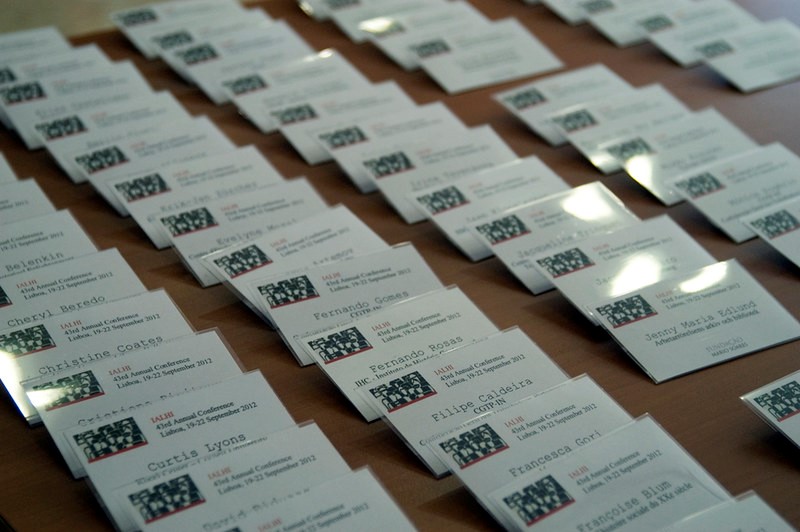
As time passed and membership grew, some organizational changes became necessary. In 1985 it was decided to create a ‘coordination committee’ of five members, in order to assist the duties of the secretary and handle the business of the association. In 2005, the conference decided to split the tasks of secretary and treasurer, to avoid the need to move the financial structure from one institute to another every time the secretary changed. Since then, all administrative/financial matters are handled at the IISH in Amsterdam. In 2011, it was also decided to create a legal body, named the ‘IALHI Foundation’.
In financial terms, the IALHI remains up to this day an autonomous organization that relies on the yearly contribution of its members. In the first conference it was agreed ‘to ask members to pay a nominal fee of 2 pounds to cover the secretary’s expenses’. The amount was subsequently raised due to inflation and some increasing expenses. Since the 1980s, attempts have been made to get funding from external parties in order to promote special projects. In the minutes of the 19th Conference (Zurich, 1988), for instance, it was noted that ‘the financial situation of IALHI is not bad, but it proves hardly possible to get grants from governmental or international organizations, the only feasible means, though, to allow interesting large-scale projects’. The task proved difficult, however. In 1981 it was informed that ‘efforts to get support from UNESCO, ILO and EEC have failed’. In 1984, Wouter Steenhaut declared that the Socialist Group of the European Parliament was ‘ready for financial assistance for conferences held in countries who are members of EC’.[15] The following year, it was informed that this approach had proved unsuccessful.
Later on, substantial funding was obtained from EU funding, as explained below.
Activities and projects: What does the IALHI do?
More than anything else, the goal of the IALHI has been to share knowledge among librarians, archivists, scholars, and collectors in the field of labour and social history. In the context of the 1970s, given the development and expansion of labour history institutions and the available technology, it was important for members to be able to produce and share lists with titles and publications available in each institution, in order to refer to each other collections, exchange duplicates, etc. With this in mind, the objectives of the new institution, as approved in the founding conference in 1970, were as follows: ‘a) to foster closer co-operation between institutions of the association, b) to inter-lend, where this is possible, c) to issue bibliographies, holding lists etc., d) to interchange publications and duplicates, this to be arranged by personal contact and not to be regarded as a matter of course’.

Bonn, 2011
According to Jaap Kloosterman, the need for closer cooperation among labour institutions ‘was prompted, among other things, by the sharp increase in publications in the field: it became more difficult to know what appeared, more difficult to buy everything and more interesting to exchange’.[16] Irene Wagner explained that the annual conference of the IALHI would become ‘the forum for the exchange not only of material, but also for discussion of technical problems’. Getting to know each other was key: ‘a most important aspect of the conference is the personal contact with not only members of the association but also with people in the various institutes who attend the conference as guests. Information across national frontiers is easier once one knows the person one is dealing with face to face’.[17]
Apart from becoming a forum for the exchange of expertise and information, since its establishment the IALHI discussed the possibility of engaging in other, larger, projects. A note of caution was always present: in the 2nd Conference held in Stockholm in August 1971, after a ‘lengthy discussion’, it was ‘the general feeling that it was unrealistic to aim too high and that practical matters, important to us should be in the shape of small, manageable projects which would not involve too much time and manpower’.[18]
Some publications were part of these initiatives and projects, such as the edition of the papers presented at each conference, and a Newsletter, which included information about collections and research of the members. Other initiatives were an IALHI Directory of 205 pages, containing information of 90 institutions, and a collection of documents of the Socialist International and the European Trade Union Confederation, among other publications.
The Labour History Serial Service (maintained between 1997 and 2013) was an initiative to collect and publish the table of contents and article descriptions of a number of labour history journals, as a way of ensuring that all institutions and its users could retrieve this information and ask for copies in case of necessity.
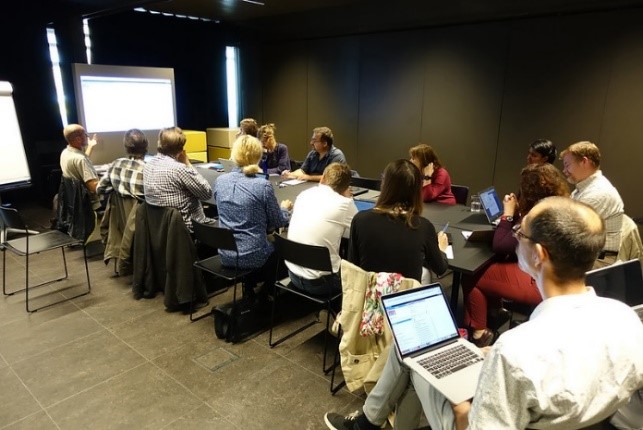
Ghent, 2017
Halfway the 2000s it became apparent that the IALHI had to embrace the possibilities opened up by new technologies and especially the internet. As a report of a workshop held in early 2009 put it, ‘we spoke a lot in Johannesburg, and we all shared to same statement: the IALHI is coming to a turning point of its history. We have to deal with a revolution — the digital revolution — that none of us, even the biggest institutions, can face alone’.[19] The publication of the printed newsletter was stopped in 2002, when it was decided to continue online, in what was to become the IALHI News Service, and currently the Social History Portal News Service.
Another important initiative was the Labour History Index (started in 2000), a first attempt to build an integrated, web-based search platform for collection-related data from IALHI institutions. The goal was to make existing data more accessible to users. It was to be followed by a bigger initiative, namely the HOPE Project (2010-2013), defined as a ‘Best Practice Network of archives, libraries and museums of social history institutions across Europe’ which aimed to improve access to the vast amount of highly significant but scattered digital collections on social history.
The project was successful in obtaining EU funding and one of its main results was the development of the Social History Portal search engine. The SHP currently works as a common gateway to a number of collections of archives, libraries and documentation centres, where users can search and browse more than 140 collections comprising more than 2 million records among which 900,000 digitised objects (archives, books, brochures, leaflets, photographs, posters, prints, cartoons, sound, films and videos). Together, they document more than 200 years of history: from the French Revolution and the beginnings of democracy and the labour movement in Europe, to the fall of the Eastern Bloc and the rise of new networked social movements.
The Social History Portal makes use of modern tools but remains in line with the original objectives that prompted the foundation of the IALHI fifty years ago — sharing information about the holdings and archival material of each institution, for all interested users and researchers to know where to find content.
Currently, the collections available at the SHP are held by 21 specialized archives and libraries in 13 different European countries. All IALHI members are invited and encouraged to add their metadata to the portal, in order for their own collections to be searchable. The expansion of the SHP with data of institutions from different continents will also help to make its contents more global.
Looking ahead
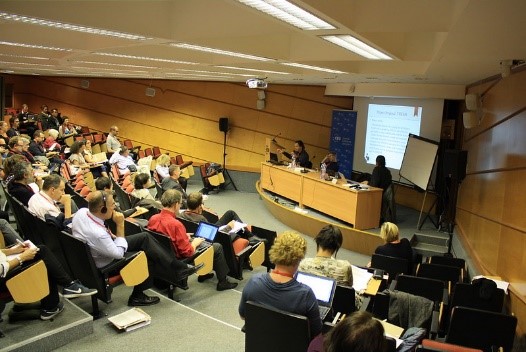
Budapest, 2013
Fifty years after its foundation, the IALHI is the foremost network of social history institutions, with more than 120 member institutions coming from five continents. Throughout these years, the IALHI grew in size and developed important projects and initiatives, while at the same time keeping the spirit that inspired the founding conference of 1970: bringing together archives, libraries, research centres and other institutions active in the field of labour history and social movements and creating an international community of archivists, librarians and researchers, in order to exchange ideas, make collections and publications more visible, and discuss solutions to problems of research, preservation and dissemination.
IALHI's main goal is to facilitate the exchange of expertise in order to preserve, and promote the access to, and the use of, their respective collections. As a large international network of institutions of historical research and cultural heritage, the IALHI is also well positioned for contributing to and participating in international projects.
Acknowledgments
Unless otherwise noted, the photographs come from IALHI’s own collection, available online at https://www.flickr.com/photos/ialhi. Thanks are due to Chris Coates and Jeff Howarth (TUC Library Collections) and Aurelio Martín López (Fundación Pablo Iglesias) for their comments and photographs.
References
[1] Harriet Godfrey-Holmes, ‘Irene Wagner Obituary’, The Guardian, 7 March 2016. <https://www.theguardian.com/politics/2016/mar/07/irene-wagner-obituary>
[2] Irene Wagner, ‘Report on the International Association of Labour History Institutions’, International Labor and Working-Class History, 13 (May, 1978), p. 18.
[3] Dieter Schuster, Chronik und Dokumente zur frühen Geschichte der International Association of Labour History Institutions (IALHI) (Bonn 2008), p. 3. <http://library.fes.de/pdf-files/bibliothek/05588.pdf>
[4] Huub Sanders, Het virus der betrokkenheid. Het Internationaal Instituut voor Sociale Geschiedenis 1935-1989 (Amsterdam, Amsterdam University Press, 2019), p. 336. For a brief history of many of these institutions, see Jaap Kloosterman, ‘In Bebels voetspoor. Wouter Steenhaut en de IALHI’, Brood & Rozen. Tijdschrift voor de Geschiedenis van Sociale Bewegingen 14 (2009), pp. 26-35. Available in English at https://ialhi.org/bebel-footsteps.
[5] Schuster, Chronik und Dokumente, p. 11.
[6] Schuster, Chronik und Dokumente, p. 11.
[7] See, for instance, Jaap Kloosterman ‘La sottile arte della relazioni: la Biblioteca e l’Instituut negli anni ’50’, Annali. Fondazione Giangiacomo Feltrinelli 52 (2014), pp. 52-67.
[8] Schuster, Chronik und Dokumente, p. 17.
[9] Kloosterman, ‘In Bebels voetspoor’.
[10] Jaap Kloosterman, ‘A Word From the Ex-Secretary. XXVII Conference, Athens 1996’ <https://ialhi.org/iconf-96-exsecretary>
[11] Wouter Steenhaut and Geert van Goethem, ‘28e Conferentie van de IALHI’, Brood & Rozen. Tijdschrift voor de Geschiedenis van Sociale Bewegingen 1998/1, p. 52.
[13] For a full list of members, see https://ialhi.org/members.
[14] For a full list of conferences, including minutes and reports where available, see https://ialhi.org/conferences.
[15] Schuster, Chronik und Dokumente , pp. 24, 30, 35.
[16] Kloosterman, ‘In Bebels voetspoor’.
[17] Wagner, ‘Report’, p. 18.
[18] Schuster, Chronik und Dokumente , p. 11.
[19] International workshop for an international concerted policy of labour history archives digitization, Paris, France, 14 February 2009, https://ialhi.org/sites/default/files/conferences/2009-02-14-report.pdf
Further Reading
Lucas Poy (2020), El 50° aniversario de la International Association of Labour History Institutions (IALHI). Su lugar en la historia de los archivos y bibliotecas del movimiento obrero. Archivos de historia del movimiento obrero y la izquierda 9(2020)17: 185-200. https://doi.org/10.46688/ahmoi.n17.285
Lucas Poy (2021), O lugar da International Association of Labour History Institutions na história dos arquivos e bibliotecas do movimento operário. Revista Mundos Do Trabalho, 13, 1-13. https://doi.org/10.5007/1984-9222.2021.e81904
